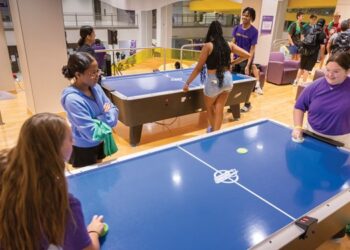In the March/April 2021 issue, Samantha Steel, the program coordinator for Aquatics at the University of Nevada, Las Vegas (UNVL), shares advice on aquatics best practices.
How have the best aquatics practices evolved over the last six months? Are there any new areas you have to consider?
SS: The COVID-19 pandemic has drastically shifted best practices in aquatics. The concept of patron safety has evolved from ensuring patrons are safe in the water and on the deck to now include how patrons are interacting with one another, sanitation of equipment, and upkeep on all new local and state regulations that are directly tied to the pandemic. For example, at UNLV we now have a lane reservation system and have changed how we teach swim lessons to limit exposure to other patrons.
What are best practices for training aquatics staff, whether in-person or virtually?
SS: Having a positive team environment and creating multiple opportunities for staff to practice their skills are two of the most important aspects of training aquatics staff. Trainings are a time where staff can make and learn from mistakes. It is also a time to celebrate successes and relationship building. The environment should reflect the idea that feedback from peers and supervisors is expected in a constructive yet positive way.
EXTRA CREDIT: How do you encourage staff to try and continue practicing and learning even during a pandemic?
Additionally, running emergency audits with staff is imperative to their success in real life scenarios. During audits, staff get the opportunity to practice their emergency responses and how to communicate with their peers in high stress scenarios.
In terms of programming, how do you decide what to offer and when to schedule it?
SS: Our facility is open to students, faculty, staff and members of the Las Vegas community. Because of this, we try our best to offer a program that fits everyone’s wants and needs. In a non-COVID world, we offer:
- Three different types of swim lessons — children’s group, adult group and private special events like a Halloween pool party, back to school rave and triathlon.
- Six different American Red Cross certification classes.
- Family swim nights.
- The Swim the Distance Challenge.
We try to schedule programming during times that work best for our patrons. Most of our certification classes and children’s programming falls on the weekends. Adult group lessons are held at night, and private swim lessons offer flexible scheduling. Our ongoing programs, such as Swim the Distance Challenge, run the duration of the semester.
EXTRA CREDIT: How can aquatics professionals do a better job of talking up their experience? Read it.
After each program, we ask our patrons if they have any recommendations regarding scheduling and if they have any idea for programs we can offer. We have received a lot of great responses from our patrons that have impacted when and what programs we offer.
Operationally, what are some of the biggest considerations to keep a pool up and running?
SS: Staffing is the biggest consideration to keep the pool running. You can have a pristine pool and fantastic programs, but without staff to facilitate programs and guard the pool, your efforts are futile. Having highly trained staff is so important to have smooth operations.
Another consideration for operations is having a strong relationship with your pool operator. I am very fortunate to have a wonderful pool operator at my facility to keep our pools in tip-top shape.
Heather Hartmann is the editor for Campus Rec Magazine. She can be reached at heather@peakemedia.com.











